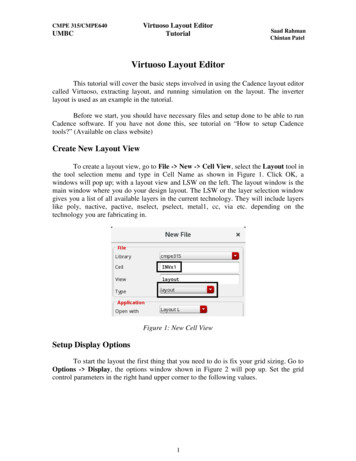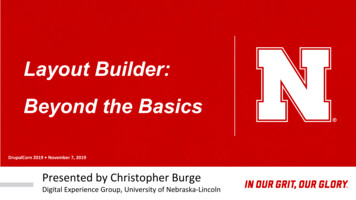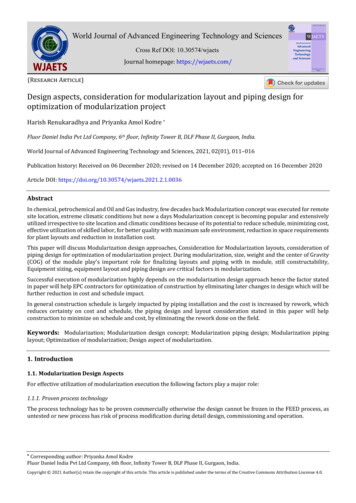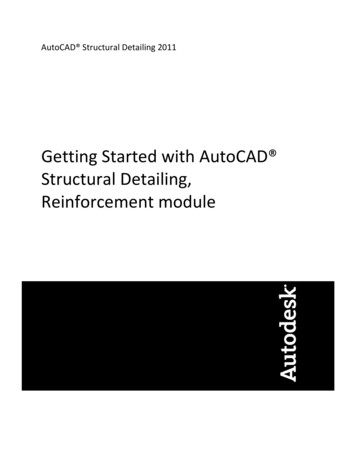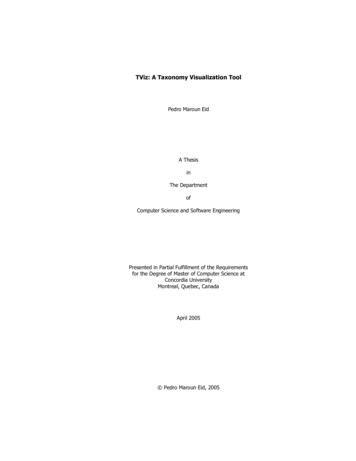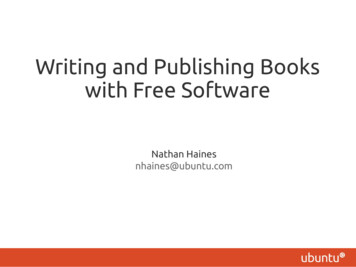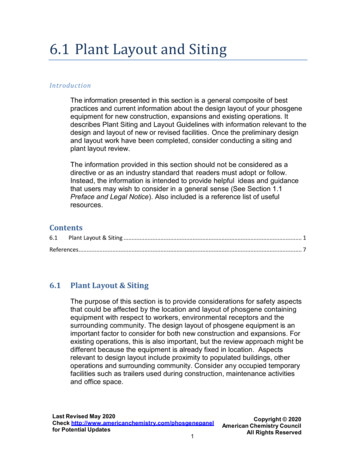
Transcription
FINANCIAL-Guide Layout 1 7/20/17 3:05 PM Page 45A Sponsored Feature of the Orange County Business Journal July 24, 2017
FINANCIAL-Guide Layout 1 7/20/17 3:05 PM Page 46B-46 ORANGE COUNTY BUSINESS JOURNALLocal breaking news: www.ocbj.comJULY 24, 2017Elder Financial Abuse: The Silent Crimeby Debbie McMaster, First Vice President, Investments, Wells Fargo AdvisorsUse the below resource to properly report suspected elder financialabuse.u National Center on Elder Abuse ncea.acl.govElder financial abuse has the potential to impact all of us on some level.Whether you are protecting a loved one from becoming a victim oractively taking precautions to protect your personal estate,fraud and exploitation is a risk that grows as people age.It is important for individuals to understand themagnitude of this crime, identify ways to both activelyprevent and stop abuse, as well as understand howto escalate if it is suspected.UnderstandSeniors lose an estimated 36.5 billion everyyear to the crime of elder financial abuse.1 Infact, according to the 2010 InvestorProtection Trust (IPT) Elder FraudSurvey, more than 7 million olderAmericans — one out of every five overthe age of 65 — have fallen victim to afinancial swindle.2 As Baby Boomersturn 65 at a rate of 10,000 a day, thethreat of potential abuse heightens.It is imperative we take preventativemeasures to confront this epidemic,including educating ourselves on thepotential warning signs and using theresources and tools available to stop fraudand abuse from occurring.IdentifySpotting exploitation can be difficult as the perpetrators ofthese crimes tend to be close friends or relatives. Studies project thatapproximately 70 percent of elder financial abuse is committed by familymembers, friends, trusted persons or others known to the individual beingexploited.3 This increasingly blurred line of those who have one’s best interest atheart and those who don’t makes spotting these scams a challenge.Here are a few warning signs:u Sudden reluctance to discuss financial mattersu Sudden, atypical or unexplained withdrawals or wire transfers from theiraccounts, or other changes in their financial situationsu New best friends and “sweethearts”u Behavioral changes, such as fear or submissiveness, social isolation, withdrawnbehavior, disheveled appearance, and forgetfulnessu Changes in the will, especially when they might not fully understand theimplicationsu Large, frequent “gifts” to a caregiveru Missing personal belongingsReportReporting is the most important step to escalating suspected elder financialabuse. Studies show that as few as one in 44 cases of elder financial abuse arereported.4 Victims tend to keep details secret for a number of reasons – fear ofbeing victimized again, reluctance to incriminate a family member or friend, oradmitting vulnerability are among them.About Wells Fargo AdvisorsWith 1.6 trillion in client assets as of March 31, 2017, Wells Fargo Advisorsprovides investment advice and guidance to clients through 14,657 full-servicefinancial advisors and 4,093 licensed bankers. This vast network of advisors, oneof the nation’s largest, serves investors through locations in all 50 states and theDistrict of Columbia. Wells Fargo Advisors is the trade name used by Wells FargoRemember, elder financial exploitation is not exclusive.Consider the below to help protect yourself frompotential abuse:u Organize your estate. No matter how old you are,it’s a good idea to update and organize all yourfinancial documentation, including your will,financial powers of attorney, real estate deeds,insurance policies, pension and trustdocuments, birth and marriage certificates,and Social Security paperwork.Maintaining an organized file, andhelping others (such as a parent, uncleor close friend) do the same, can makeit easier to spot the inconsistenciesand red flags that could signalfinancial abuse.u Make a list of financial contacts.Bankers, insurance agents, attorneys,accountants, stockbrokers, and otherprofessionals should be on it. Shareyour list with your Financial Advisor andwith family members you trust. Inaddition, ensure you have a trustedcontact on file. This is an individual who theadvisor could contact in the event of anemergency or suspected abuse.True Link Financial. “True Link Report on Elder Financial Abuse.” 2015Investor Protection Trust (IPT). “IPT Elder Fraud Survey.” 20103Jewish Council for the Aging, National Center for Elder Abuse. Paley Rothmanarticle “Who Commits Elder Financial Abuse and Why Isn’t It Reported?” 2016.4National Adult Protective Services Association. “Policy and Advocacy.”www.napsa-now.org. 2017.12Wells Fargo Advisors is a trade name used by Wells Fargo Clearing Services,LLC and Wells Fargo Advisors Financial Network, LLC, Members SIPC, separateregistered broker-dealers and non-bank affiliates of Wells Fargo & Company. 2016 Wells Fargo Clearing Services, LLC. All rights reserved. CAR- 0517-05750Debbie McMasterDebbie McMaster is a First Vice President,Investments for Wells Fargo Advisors. Heroffice is in Irvine and she can be reached at949.862.1242.Clearing Services LLC and Wells Fargo Advisors Financial Network, LLC,Members SIPC, separate registered broker-dealers and non-bank affiliates ofWells Fargo & Company. All data includes Wells Fargo Clearing Services, LLC,(including its predecessor firms) and Wells Fargo Advisors Financial Network, LLC,as of March 31, 2017.www.wellsfargoadvisors.com
FINANCIAL-Guide Layout 1 7/20/17 3:05 PM Page 47JULY 24, 2017Local breaking news: www.ocbj.comORANGE COUNTY BUSINESS JOURNAL B-47
FINANCIAL-Guide Layout 1 7/20/17 3:06 PM Page 48B-48 ORANGE COUNTY BUSINESS JOURNALLocal breaking news: www.ocbj.comJULY 24, 20174 Tests: Do You Qualify for a “Tax-Free” Growth Account?by Sean Walker, Principal, Applied Financial Planning and “The Money Guys” Radio HostWith continued talk about tax changes coming from Washington, D.C., decidingwhere to invest your hard-earned assets in today’s market can be a challenge foreven the savviest investor.In an ideal world, which of these investment vehicles most appeals to you?u a taxable account (for liquidity)u a tax-deferred account (for retirement income)u a tax-free growth account (for use toward personal or business goals)Most investors would choose “tax-free,” however qualifying for these investmentsis a challenge. The IRS imposes significant restrictions on who can participate intax-free growth accounts.A ROTH IRA, for example, is an excellent vehicle for investing post-tax dollars intoa tax-free account. However, if you make more than 133,000 (filing single in2017), you can’t contribute to a ROTH. And even if you are eligible, the IRS limitsthe annual investment to 6,500 for those age 50 and over.If you find these Federally imposed thresholds a bit too confining, you’re notalone. At Applied Financial Planning, we have introduced “tax free” investmentstrategies into many of our clients’ portfolios. Here are 4 basic tests to determine ifthis strategy has a place in your plan:1. You Have Excess Income or Liquid Assets. You have extra income that youare investing on a consistent basis or you have lump sum assets that you wouldlike to invest in the future.2. You Have Financial Endurance. You have patience and an eye toward longterm financial goals. You can sustain annual, predictable contributions to atax-free strategy for 7 to 10 years or more.3. You Want to Protect Your Family or Business. You have a desire to plan forunforeseen life events, such as death or divorce, or to fortify your businessagainst vulnerabilities, such as unfounded claims or lawsuits.4. You Want to Keep What’s Yours. Minimizing tax liability is a priority. You andyour family want to hold on to your assets rather than subsidizing hot-topic,narrow causes championed by those in Sacramento and Washington, D.C.How does it work? The Money Guys have simplified this approach. It requires anadvisor-client relationship that prioritizes positive long-term performance potentialahead of quarterly reporting goals. This liberating perspective allows you — theclient — to focus on the quality of your investment strategies rather than fret aboutpost-retirement tax status.These “tax free” strategies typically appeal to mid-career executives in a high taxbracket who have run out of room to invest in a tax-deferred 401(k). Oftentimes,they lean too heavily on their company’s success rather than developing anindependent pool of resources.The examples noted within were hypothetical and are not representative of any specific investment.Your results may vary. This information is not intended to be a substitute for specific individualized tax orlegal advice. We suggest you discuss your specific situation with a qualified tax or legal advisor. TheRoth IRA offers tax deferral on any earnings in the account. Withdrawals from the account may be taxConsider this investor’s experience. Over the course of 17 years, he graduallyinvested about 200,000 (after taxes) in an account that today has grown to amarket value of more than 800,000. He plans to use this investment to generatetax-free income for years to come. Moreover, he can use that money as he wishes– to start a business, buy a house, retire, send his children or grandchildren tocollege or leave a legacy.If you find this tax advantaged investment compelling, call The Money Guys atApplied Financial Planning today. We can help you explore whether this solutionwill work for you and your family.Sean WalkerSean Walker is a Principal with AppliedFinancial Planning and registered financialadvisor through LPL Financial. He received abachelor’s degree in Economics with anemphasis in Finance from The Wharton Schoolat the University of Pennsylvania and holds anMBA from UCLA Anderson School ofManagement. He can be reached atSean.Walker@LPL.com or (800) 452-5264.free, as long as they are considered qualified. Limitations and restrictions may apply. Withdrawals priorto age 59 ½ or prior to the account being opened for 5 years, whichever is later, may result in a 10%IRS penalty tax. Future tax laws can change at any time and may impact the benefits of Roth IRAs.Their tax treatment may change. No strategy assures a profit or protects against loss.
FINANCIAL-Guide Layout 1 7/20/17 3:32 PM Page 49JULY 24, 2017Local breaking news: www.ocbj.comORANGE COUNTY BUSINESS JOURNAL B-49
FINANCIAL-Guide Layout 1 7/20/17 3:06 PM Page 50B-50 ORANGE COUNTY BUSINESS JOURNALLocal breaking news: www.ocbj.comJULY 24, 2017Data Is the New Oil, But Only if It’s CleanSome say data is the new oil, not just fuelling how organizations work, butlubricating the wheels of commerce and communication – it’s a valuablecommodity.Chief information officers regale how they’re going to harness data, wrangle it,apply machine-learning, and make a difference to their bottom line.“Yet most organizations are plagued with inaccurate data and poor contactdetails,” says Bud Walker, VP sales and strategy at Melissa Global Intelligence, acompany with more than 30 years’ experience and over 10,000 customersworldwide relying on its data quality solutions, including banking and financialservices providers like Bank of America, Citi, US Bank, Discover, and SunTrust.“There’s a lot of hype around Big Data. Yet the quality of any set of information iscrucial. With clean, verified data you can make informed decisions; with poor datathat’s not verified you make ill-advised ones,” Walker explains.Expectations relating to data quality have risen dramatically since the financialcrisis. Static, raw data is no longer viable. Corporations must be able to clean,aggregate and perform advanced analysis on dynamic data. This createsactionable intelligence that informs boardroom decisions. This only comes fromtrusted data assets.“Regulatory reporting and risk analytics are now imperative in this economicclimate. There is a much greater duty of care. Having more timely and accuratedata is essential for making risk and return trade-off decisions. It’s aboutmaximizing corporate resilience, shareholder returns, and accountability,” statesWalker.In the U.S., identity theft reached a fever pitch, with 16 billion stolen from 15.4million customers in 2016, according to a recent study by advisory firm JavelinStrategy & Research.it doesn’t. Then again, can companies afford not to do it? The amount of time andeffort that’s wasted with wrong mailings and marketing is vast. Clean, accuratedata translates to the bottom line. If you have reliable data, you own the customer;if you own the customer, you own the future.”Melissa Global Intelligence has been a pioneer in data quality management since1985. This has enabled the company to build technologies that address the datachallenges and to establish trusted data sources in the process, scaled up acrossthe world, creating a gold standard in global ID verification.The number of U.S. data breaches hit an all-time high of 1,093 in 2016 – a 40percent hike over the previous year, according to the Identity Theft ResourceCenter and CyberScout. These data breaches have placed greater scrutiny overthe need for more data security initiatives in the future.“It is increasingly vital for all organizations to be able to properly verify and formatas many data points as possible, whether it’s personal ID, postal addresses,emails or mobile phone numbers. Fraudulent, duplicate, and incorrect contactdata is an expensive loss,” Walker explains.“We are the identity piece in the data puzzle. We can check your individual data tosee if you’re real. We can verify an individual’s name, address, phone, email, dateof birth, and national ID against trusted multisourced reference data. There arefew firms that have the global footprint that Melissa has,” says Walker.“The issue is that CIOs think that data verification involves huge costs. The fact isMany CIOs do understand the need to have clean, less vulnerable data, but theystruggle to implement a solution. Other organizations don’t have the skill sets toimplement it. Also, no one likes to admit they have data quality issues.“It’s not going to be a matter of choice. It will be law. We’re reaching the tippingpoint. The fact is data is too vulnerable. Few people run into a bank now and stealby the back door. Instead, they sit at home in their basement and use identityfraud,” Walker warns.For more information, please go to: www.Melissa.com.
FINANCIAL-Guide Layout 1 7/20/17 3:34 PM Page 51JULY 24, 2017Local breaking news: www.ocbj.comORANGE COUNTY BUSINESS JOURNAL B-51
FINANCIAL-Guide Layout 1 7/21/17 11:25 AM Page 52B-52 ORANGE COUNTY BUSINESS JOURNALLocal breaking news: www.ocbj.comJULY 24, 2017Strategic Alternatives for Financially Troubled or Distressed Companiesby Richard H. Golubow, Founder and Managing Partner, Winthrop Couchot Golubow Hollander, LLPBusiness owners often assume that bankruptcy is the only option for reorganizationor orderly liquidation of a distressed company. There are many advantages to abankruptcy: the process is orderly and reasonably predictable; the bankruptcy courthas broad powers; and all creditors are forced to participate and are bound byorders of a bankruptcy court. However, there are several disadvantages to abankruptcy: bankruptcy tends to be expensive; often prohibitively so in smaller, lesscomplex cases; and can drag on for a long time.There are several viable alternatives to bankruptcy that, depending on the situation,may reduce if not eliminate some of the disadvantages of bankruptcy while realizingmany of the benefits. It is not that the desired results cannot be achieved through abankruptcy, but rather the recognition that each business has its own circumstancesand diverse set of tangible and intangible interests to protect that may make nonbankruptcy alternatives more appropriate for a particular situation. For example,other options such as the use of out-of-court workouts and agreements,assignments for the benefit of creditors and state or federal court receiverships arealternatives that should be considered.Out-of-court workouts and agreements, often in the form of compositions,extensions and standstill agreements, can be made without incurring the time andexpense of a courtroom proceeding. Such agreements usually are between thedebtor and its creditors whereby the creditors agree to revise payment terms ordischarge a portion of their claims against the debtor in exchange for payment of alesser amount than what is actually owed.A general assignment for the benefit of creditors is an out-of-court procedure usedto liquidate a debtor’s property for the sole purpose of repaying creditor claims.Under a general assignment, the debtor voluntarily transfers title of all assets to anassignee, which is an independent third party fiduciary, to liquidate and distribute theproceeds thereof to the debtor’s creditors. A general assignment can be an excellentvehicle for transferring all assets of a troubled company to a new owner so that thebusiness can be continued as a going-concern.In a receivership, a court appoints an independent third party fiduciary to takepossession of the property of a debtor and to operate the property to the extentdeemed necessary until such time as the property has been liquidated. In thisrespect, the court acts as a referee in the proceedings.This article is intended to highlight some, but not all the alternatives to bankruptcy.Other options exist as well, including the use of bulk sales of assets, deeds in lieu offoreclosure, exchange offers, mediation and arbitration. Businesses experiencingfinancial distress should always consider bankruptcy and non-bankruptcyalternatives, which may provide considerable flexibility not available in bankruptcy,and a substantially less adversarial environment. These non-bankruptcyalternatives, if appropriate, will likely translate into less time, improved commerciallydriven solutions, and reduced fees and costs.Richard H. GolubowRichard H. Golubow, a founder and managingpartner of Winthrop Couchot Golubow Hollander,LLP, is an attorney who devotes his practice torepresenting primarily corporate debtors in out-ofcourt workouts and Chapter 11 reorganizations. Mr.Golubow has been honored as the recipient ofbankruptcy or restructuring attorney of the yearawards by several leading international financialorganizations and publications. For moreinformation including discussing advantages anddisadvantages to bankruptcy and non-bankruptcy alternatives, contact Mr.Golubow at 949.720.4135 or rgolubow@wcghlaw.com.
Applied Financial Planning today. We can help you explore whether this solution will work for you and your family. Sa Wa Sean Walkeris a Principal with Applied Financial Planning and registered financial advisor through LPL Financial. He received a bachelor's degree in Economics with an emphasis in Finance from The Wharton School

